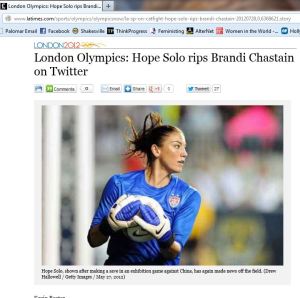It’s only one day into the Olympics and I’m already feeling put off by the sexism female athletes still face as they compete in the games.
First, it was the revelation that many countries were flying their male athletes first class while the women’s teams (even those with much more success in their respective sports) flew economy.
Second, Australian newspapers decided to focus on the weight, rather than amazing Olympic career, of swimmer Leisel Jones. Thus reminding us, as Chloe at Feministing points out,
that no matter how accomplished a woman is, no matter how talented, how skilled, how strong, how tenacious, how gutsy, she is not exempt from the rules of modern femininity. Not even during the Olympic Games. She has to be skinny and beautiful before she can be recognized for being any of those other things, and if she isn’t skinny and beautiful, we’ll ignore her guts and tenacity and talent and dedication and waste our time debating whether or not she’s gained weight during the twelve years she’s been in the public eye.
And today I read an article in the LA Times about how Hope Solo, goal keeper for the U.S. women’s soccer team, is in a “catfight” with Brandi Chastain on Twitter over comments Chastain made while broadcasting the U.S.-Colombia match. Because when a woman expresses an opinion involving another woman they are like screeching cats. While the sexist term “catfight” does not appear in the article, it not-so-well hidden in the URL.
Who doesn’t love a good catfight? Erin Gloria Ryan dares to pose this question over at Jezebel in her post, “America Loves a Crying Gymnast.”
America loves a crying gymnast because a crying gymnast cries because she’s beaten someone, or lost to someone, another girl who is probably also crying. They’re the end result of a female-female rivalry — who doesn’t love a good catfight? — and the media loves to manufacture catfights even where they don’t necessarily exist.
Let’s hope this list doesn’t just continue to grow as we get deeper into the Games (it will). After all, this is the first Olympics in which women are represented on every team and the U.S. team consists of more men than women. Let’s cover them as athletes, rather than lady athletes, mmmkay?
UPDATE (7.30.12): Check out this great piece by Meg Heery about sexism in the Olympic coverage: London 2012, Day 2: Women Win, Not Unicorns. It reminded me of the finding that female athletes’ successes are attributed to luck, while male athletes’ successes are attributed to skill by the commentators.
What have you noticed about the Olympics coverage?


